Lit. “A call, invocation (ie of God’s help).” A term used to express a system of incantation which is held to be lawful by orthodox Muslims; whilst sibr, “magic”, and kahanah, “fortune-telling”, are said to be unlawful, the Prophet having forbidden both.
From the Muslim books it appears that Muhammad is believed to have sanctioned the use of spells and incantations, so long as the words used were only those of the names of God, or of the good angels, and of the good genii; although the more strict amongst them (the Wahhabis, for example) would say that only an invocation of God Himself was lawful – teaching which appears to be more in accordance with that of Muhammad, who is related to have said “There is nothing wrong in using spells so long as you do not associated anything with God.” (Mishkat, xxi c I) It is therefore clearly lawful to use charms and amulets on which the name of God only inscribed, and to invoke the help of God by any ceremony, provided no one is associated with Him.
The science of da’wah has, however, been very much elaborated; and in many respects its teachers seem to have departed from the original teachings of their Prophet on the subject.
In India, the most popular work of da’wah is the Jawahiru ‘l-Khamsah, by Shaikh Abu ‘l-Muwayyid of Gujarat, A.H. 956, in which he says the science is used for the following purposes. (1) To establish friendship of enmity between two persons. (2) To cause the cure, or the sickness and death, of a person, (3) To secure the accomplishment of one’s wishes, both temporal and spiritual. (4) To obtain defeat or victory in battle.
This book is largely made up of Hindu customs which, in India, have become part of Muslimism; but we shall endeavor to confine ourselves to a consideration of those sections which exhibit the so-called science as it exists in its relation to Islam.
In order to explain this occult science, we shall consider it under the following divisions:
1. The qualifications necessary for the ‘amil or the person who practices it.
2. The tables required by the teacher, and their uses.
3. An explanation of the terms nisab, zakat, ushr, qufl, dawr, bazl, khat, and sari’u ‘l-ijaoah, and their uses.
4. The methods employed for commanding the presence of the genii.
I. When anyone enters upon the study of the science, he must begin by paying the utmost attention to cleanliness. No dog, or cat, or any stranger, is allowed to enter his dwelling-place, and he must purify his house by burning wood-aloes, pastiles, and other sweet-scented perfumes. He must take the utmost care that his body is in no way defiled, and he must bathe and perform the legal ablutions constantly. A most important preparation for the exercise of the art is a forty-days fast (chulu), when he must sleep on a mat spread on the ground, sleep as little as possible, and not enter into general conversation. Exorcists not unfrequently repair to some cave or retired spot in order to undergo complete abstinence.
The diet of the exorcist must depend upon the kind of asma, or names of the God he intend to recite. If they are the asma u’l-jalaliyah, or “terrible attributes” of the Almighty, then he must refrain from the use of meat, fish, eggs, honey, and musk. If they are the asma’u ‘l-jawaliyah, or “amiable attributes he must abstain from butter, curds, vinegar, salt, and ambergris. If he intends to recite both attributes, he must then abstain from such things as garlic, onions, and assafoetida.
It is also of the utmost importance that the exorcist should eat things which are lawful, always speak the truth, and not cherish a proud or haughty spirit. He should be careful not to make a display of his powers before the world, but treasure up in his bosom the knowledge of his acquirements. It is considered very dangerous to his own life for a novice to practice the science of exorcism.
II. Previous to reciting any of the names or attributes of God for the establishment of friendship or enmity in behalf of any person, it is necessary to ascertain the initials of his or her name in the Arabic alphabet, which letters are considered by exorcists to be connected with the twelve signs of the zodiac, the seven planets, and the four elements. The following tables, which are taken from the Jawahiru ‘l-Khamsah, occur in a similar form, in all books on exorcism, give the above combinations together with the nature of the perfume to be burnt, and the names of the presiding genius and guardian angel. These tables may be considered the key to the whole science of exorcism.
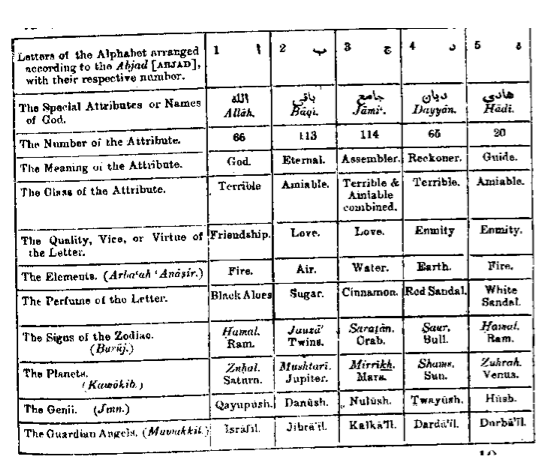
The sex of the signs of the Zodiac buruq has been determined as in the following table. Between males and females exists friendship; between males and hermaphrodites sometimes friendship sometime enmity; between females and hermaphrodites the most inveterate enmity: –
As an illustration of the use of these tables, two persons, Akram and Rahimah contemplate a matrimonial alliance, and wish to know if it will be a happy union or otherwise.
The exorcist must first ascertain if the elements (arba’ah ‘anasir), the signs of the zodiac (buruq), and the planets (kawakib), are amicable or inimicably disposed to each other in the cases of these two individuals, and also if there is a combination expressed in the ism or name of God connected with their initial letters.
In the present instance the initial letter of Akram is alif, and that of Rahimah, ra, and a reference to the foregoing tables will produce the following results: –
In considering this case, the exorcist will observed that there is a combination in the attributes of God, both belonging to the asma u ‘l-jalaliyah, or terrible attributes. There is also a combination in the quality of the letters, both implying friendship. Their respective planets, Saturn and Mercury, show a combination of either mixed friendship and enmity, or, perhaps, indifference. The sign of the zodiac, the ram being a male, and that of the virgin of a hermaphrodite, show a possible alternation of friendship and enmity between the parties. The elements, fire and earth, being opposed, imply enmity. It therefore appears that there will be nothing against these two persons. Akram and Rahimah forming a matrimonial alliance, and that they may reasonably expect as much happiness from their union as usually falls to the lot of the human race. Should the good offices of the exorcist be requested, he will, by incantation, according to the table given, appeal to the aid of the genii Qayupush abd Rahush, and of the guardian angels, Israfil and Amwakil. The perfumes he will burn in his numerous recitals will be black shoes and rose-water, and so bring about a speedy increase in the happiness of the persons of Arkam and Rahimah!
III. As we have already explained, the incantations used by exorcists consist in the recital of either the names or the attributes of God, or of certain formulae which are given in books on the subject. In the Jawahiru ‘l-Khamsah, there were many forms of incantation, but we select the following one to illustrate the subject: –
سبحانك لا اله الا انت رب كل شيء و وارثه و ارازقه و اراخمه
Subbanaka! La ilaha illa anta! Rabba-kulli-shai’in! Wa warisahy! Was raziqahu! Wa rukhimahu!
Glory be to Thee! There is no deity but Thee! The Lord of All! And the Inheritor thereof! And the Provider thereof! And the Merciful thereon!
This incantation consists of forty-four letters, exclusive of vowel points, as is shown by the following table: –
After the exorcist has recited the formula the above number of times, he should, in order to make a reply more certain treble the nisab, making it 135,000, and then add 2,613, the value of the combined number of letters, making a total 137,613 recitals. The number of these recitals should be divided as nearly as possible in equal parts for each day’s reading, provided it be completed withing forty days. By a rehearsal of these, says our author, the mind of the exorcist becomes completely transported, and whether asleep or awake, he finds himself accompanied by spirits and genii jinn to the highest heavens and the lowest depths of earth. These spirits then reveal to him hidden mysteries, and render souls and spirits obedient to the will of the exorcist.
IV. If the exorcist wish to command the presence of genii in behalf of a certain person, it is generally supposed to be effected in the following manner. He must, first of all, shut himself up in a room and fast for forty days. He should besmear the chamber with red ochre, and, having purified himself, should sit on a small carpet, and proceed to call the genius of demon. He must, however, first find out that special genii are required to effect his purpose. If, for example, he is about to call in the aid of these spirits, in behalf of a person named Bahram (بهرام) he will find out, first, the special genii presiding over the name, the letters of which are, omitting the vowel points B H R A M. Upon reference to the table it will be seen that they are Danush, Hush, Rahush, Qayupush, and Majbush. He must then find out what are the special names of God, indicated by these letters, which we find in the table are al-Baqi “the Eternal”, al-Hadi, “the Guide”, ar-Rabb, “the Lord”, Allah, “God”, al-Malik, “the King”. He must then ascertain the power of the letters, indicating the number of times for the recital, which will be thus: –
The exorcist should then, in order to call in the help of the genii, recite the following formula, not fewer than 24,8000 times: –
Ya Dannshu! For the sake of the Eternal One!
Ya Hushu! For the sake of the Guide!
Ya Rahushu! For the sake of the Lord!
Ya Qayupushu! For the sake of Allah!
Ya Majbushu! For the sake of the King!
The exorcist will perform this recital with his face turned towards the house of the object he wishes to affect, and burn the perfumes indicated according to the table for the letters of Bahram’s name.
There are very many other methods of performing this exorcism, but the foregoing will suffice as a specimen of the kind of service.
Based on Hughes, Dictionary of Islam

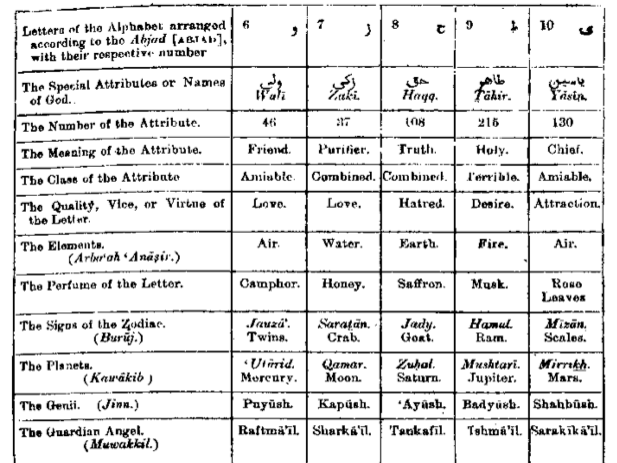
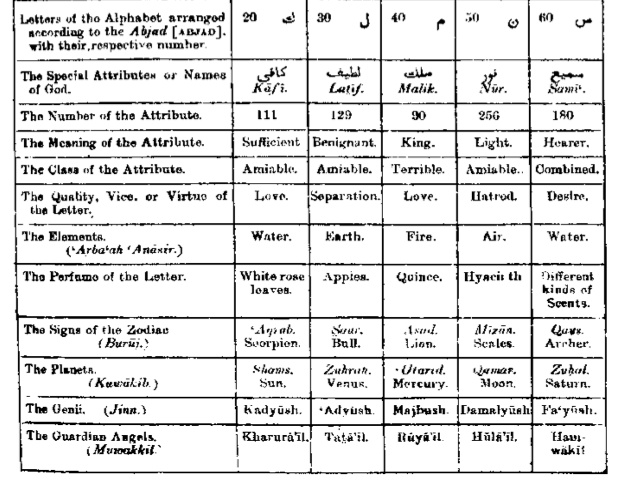
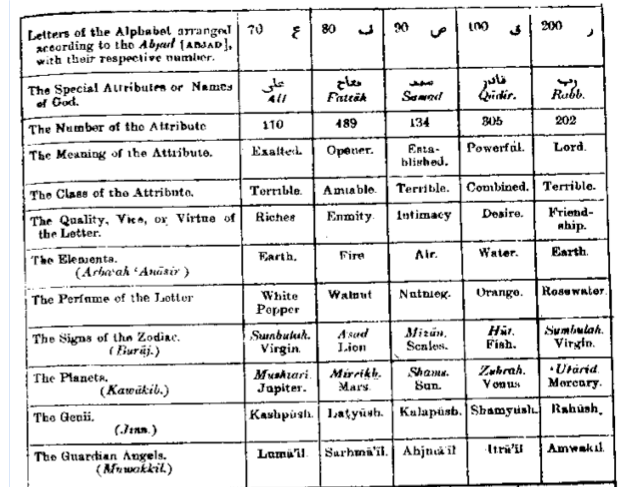
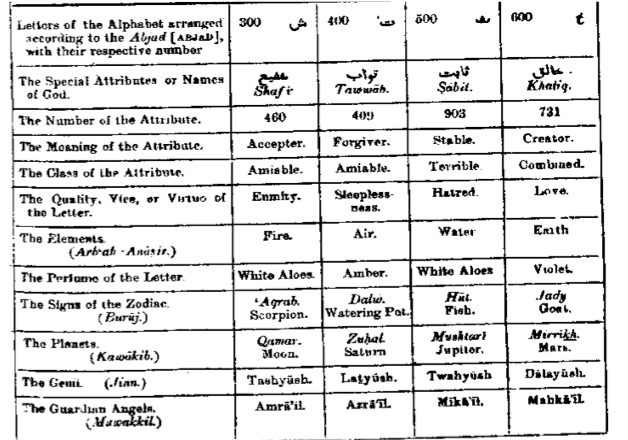
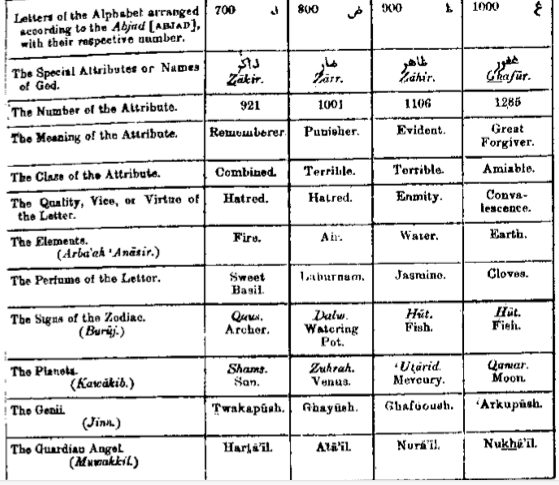
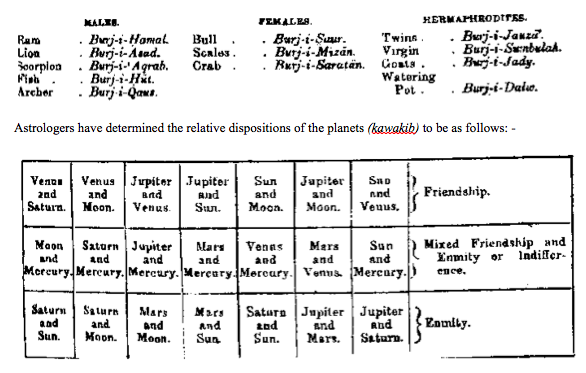
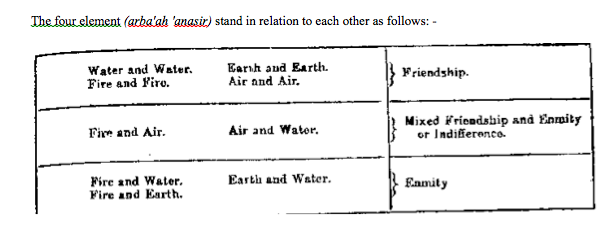
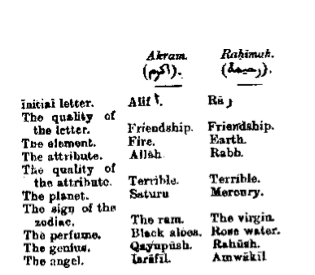
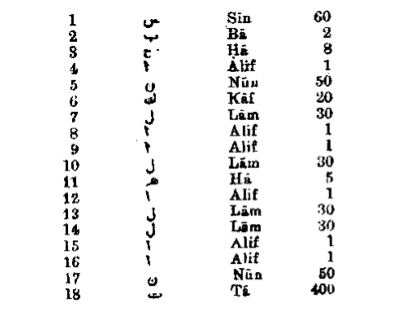
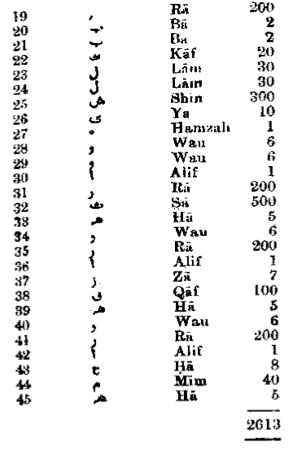
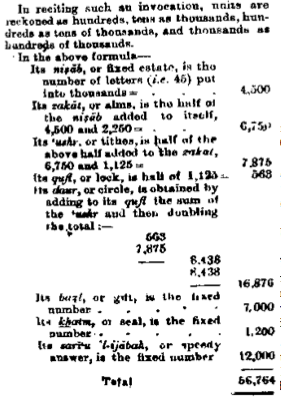
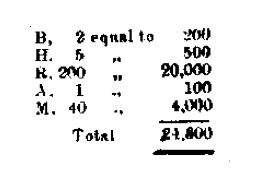
 © 2025 All Rights Reserved
© 2025 All Rights Reserved